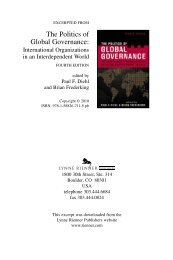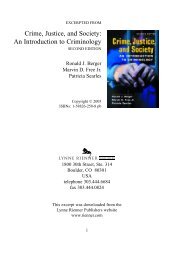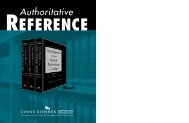Criminology and Criminal Justice - Lynne Rienner Publishers
Criminology and Criminal Justice - Lynne Rienner Publishers
Criminology and Criminal Justice - Lynne Rienner Publishers
Create successful ePaper yourself
Turn your PDF publications into a flip-book with our unique Google optimized e-Paper software.
<strong>Criminology</strong><br />
2011–12 ■ NEW & RECENT BOOKS<br />
& <strong>Criminal</strong><br />
<strong>Justice</strong><br />
lynne rienner publishers<br />
CELEBRATING 28 YEARS OF INDEPENDENT PUBLISHING
<strong>Lynne</strong> <strong>Rienner</strong> <strong>Publishers</strong><br />
Take advantage of our 20% discount on purchases of three or more books.<br />
Just fill out the order form at the back of this catalog. Don’t delay—this<br />
offer ends December 15, 2011!<br />
If you can’t find the book you are looking for in this catalog, please visit<br />
our website, www.rienner.com, which features full descriptions, reviews,<br />
<strong>and</strong> tables of contents of all of our books. You can also download the<br />
introductions to most books, <strong>and</strong> we offer free shipping on US <strong>and</strong><br />
Canadian orders of $25 or more.<br />
If you would like to receive regular email announcements of our new<br />
books, please sign up at www.rienner.com/email.<br />
Created with professors <strong>and</strong> students in mind, our Text-in-Time ® printon-dem<strong>and</strong><br />
program allows us to make hardcover-only <strong>and</strong> out-of-stock<br />
books available at a price suitable for course use. Simply have your bookstore<br />
call our Customer Service Department at 303-444-6684 to place a prepaid,<br />
nonreturnable order, <strong>and</strong> books will be delivered within four weeks.<br />
FIRSTFORUMPRESS, a division of <strong>Lynne</strong> <strong>Rienner</strong> <strong>Publishers</strong>, provides a<br />
forum for important work that may otherwise be overlooked because of<br />
today’s market constraints. FFP publishes specialized scholarly research<br />
of the highest quality in a timely <strong>and</strong> cost-effective fashion. You will find<br />
FirstForum titles throughout this catalog.<br />
If there is a book that you would like your library to own, speak up! Your<br />
recommendations count—they help your librarian decide what to buy.<br />
2ND EDITION<br />
Crime <strong>and</strong> <strong>Criminal</strong>ity:<br />
Causes <strong>and</strong> Consequences<br />
Praise for the previous edition:<br />
“I<br />
mpressive <strong>and</strong> complete in the breadth of coverage.... Hunter<br />
<strong>and</strong> Dantzker have elegantly achieved their stated purpose in<br />
writing this book. It st<strong>and</strong>s as a broad survey of the field of criminology<br />
<strong>and</strong> will serve both students <strong>and</strong> casual readers as a h<strong>and</strong>y<br />
<strong>and</strong> accurate reference.” —<strong>Criminal</strong> <strong>Justice</strong> Review<br />
“Provides an insightful, readable panorama of the criminological<br />
l<strong>and</strong>scape.... A stimulating discourse on what crime is, why<br />
criminologists think people commit crime, <strong>and</strong> how society feels<br />
it should h<strong>and</strong>le these transgressions.” —William Doerner<br />
This concise but thorough introductory textbook bridges the<br />
gap between theory <strong>and</strong> the real world of crime <strong>and</strong> criminal<br />
justice. In clear, accessible prose, the authors discuss the full<br />
gamut of issues <strong>and</strong> concepts typically covered on the introductory<br />
course syllabus.<br />
Building on the basics covered in the first edition, this<br />
revised <strong>and</strong> updated edition uses real-world examples to<br />
illustrate theory, discusses cutting-edge crime prevention<br />
strategies, highlights the impact of crime on both victims <strong>and</strong><br />
offenders, addresses the challenges of homel<strong>and</strong> security for<br />
local police, <strong>and</strong> reflects the impact of changing criminal law<br />
on the criminal justice system<br />
Ronald D. Hunter is professor of criminology <strong>and</strong> criminal<br />
justice at Georgia Gwinnett College. Mark L. Dantzker is<br />
professor of criminal justice at the University of Texas, Pan<br />
American. Both authors are former police officers.<br />
CONTENTS: The Nature of Crime <strong>and</strong> <strong>Justice</strong>. The Problem of Crime.<br />
The Study of Crime. Deterrence <strong>and</strong> Opportunity Theories. Biological<br />
<strong>and</strong> Biosocial Theories. Psychological <strong>and</strong> Psychosocial Theories.<br />
Social Structure Theories. Social Interaction Theories. Social Conflict<br />
Theories. Integrated Theories. Holistic Theories. Victimization<br />
Theories. Dealing with Lawbreakers. Dealing with Victims. Dealing<br />
with the Law Abiding. Theory into Practice.<br />
November 2011/ca. 280 pages LC: 2011025194<br />
ISBN: 978-1-58826-773-3 pb $27.50/£20.50<br />
new<br />
Ronald D. Hunter <strong>and</strong><br />
Mark L. Dantzker<br />
www.rienner.com • 1
J. William Spencer<br />
The Paradox of Youth Violence<br />
“B<br />
rilliantly illuminates a very old <strong>and</strong> vexing problem: the<br />
troublesome character of the young.... Spencer reveals the<br />
lack of congruity between images of youth crime <strong>and</strong> empirical<br />
realities, carefully considering the practical <strong>and</strong> theoretical<br />
implications.” —Vincent Sacco<br />
Is a teenage violent offender a dangerous predator—or a vulnerable<br />
innocent that we should rescue from a life of crime?<br />
J. William Spencer probes our ambivalent response to youth<br />
violence to show how deeply entwined issues of crime, age,<br />
race, <strong>and</strong> class distort our underst<strong>and</strong>ing of an important<br />
social problem.<br />
Spencer’s pointed yet nuanced analysis traces how misconceptions<br />
about youth violence—whether in the form of<br />
gangs, school violence, “superpredators,” or cyberbullying—<br />
take root in our national consciousness <strong>and</strong> undercut our<br />
attempts to remedy the problem. Equally, it offers a new<br />
underst<strong>and</strong>ing both of the nature of juvenile delinquency<br />
<strong>and</strong> of the role of cultural politics in shaping criminal justice<br />
<strong>and</strong> social services policy.<br />
J. William Spencer is associate professor of sociology at<br />
Purdue University.<br />
CONTENTS: The Problem of Youth Violence. Constructing the Problem.<br />
The Search for Explanations <strong>and</strong> Solutions. The Drama of Iconic<br />
Narratives. Lessons Learned. Confronting Today’s Challenges.<br />
2011/211 pages LC: 2011000084<br />
ISBN: 978-1-58826-788-7 hc $55/£41.50<br />
Girls <strong>and</strong> Violence:<br />
Tracing the Roots of <strong>Criminal</strong> Behavior<br />
“F<br />
oregrounds a powerful set of voices that vividly relate the<br />
violence <strong>and</strong> trauma-saturated nature of the lives of criminally<br />
involved young women. Ryder adroitly examines how these<br />
multiple trauma experiences feed into delinquency.”<br />
—Christopher Mullins<br />
Seeking to better underst<strong>and</strong> the processes that push teenage<br />
girls to acts of criminal violence, Judith Ryder explores the<br />
relationship between childhood victimization <strong>and</strong> adolescent<br />
delinquency.<br />
Ryder draws on intimate interviews to show how teenage<br />
girls navigate experiences of physical abuse, emotional loss,<br />
<strong>and</strong> parental ab<strong>and</strong>onment, revealing how their violent acts<br />
become a means of connecting with others—however maladaptive<br />
<strong>and</strong> misplaced those connections may be. Her work<br />
suggests viable strategies for early interventions to keep<br />
at-risk young women out of the criminal justice system.<br />
Judith A. Ryder is assistant professor of sociology at St.<br />
John’s University.<br />
CONTENTS: Girls <strong>and</strong> Violence. Underst<strong>and</strong>ing Attachment Gone<br />
Wrong. The First Relationship: Parental Bonds. Traumatic Childhood<br />
Experiences of Loss. Traumatic Childhood Experiences of Violence.<br />
Coping Strategies: Running, Drugging, <strong>and</strong> Self-Harm. Illegal Acts:<br />
“I Don’t Know If You Consider that Violence.” Rethinking Violence<br />
<strong>and</strong> Delinquency.<br />
May 2012/ca. 225 pages<br />
ISBN: 978-1-58826-838-9 hc $55/£41.50<br />
Qualitative Studies in Crime <strong>and</strong> <strong>Criminal</strong> <strong>Justice</strong><br />
new<br />
Judith A. Ryder<br />
2 • <strong>Lynne</strong> <strong>Rienner</strong> <strong>Publishers</strong><br />
www.rienner.com • 3
White-Collar Crime:<br />
The Abuse of Corporate <strong>and</strong> Government Power<br />
Race <strong>and</strong> <strong>Justice</strong>: Wrongful Convictions<br />
of African American Men<br />
new<br />
Ronald J. Berger<br />
“P<br />
owerful <strong>and</strong> illuminating, this is an ideal book for the classroom.…<br />
Vivid case studies <strong>and</strong> rich theoretical frameworks<br />
make this text as engaging as it is informative.” —Erik D. Fritsvold<br />
“Exceptional…. With clear descriptions of complex events, Berger<br />
offers students a refreshing sociological perspective from which to<br />
underst<strong>and</strong> the seemingly ambiguous, controversial, complex, <strong>and</strong><br />
pervasive forms of white-collar crime.” —A. Javier Treviño<br />
When does cutting corners in pursuit of profit become a crime?<br />
When should the misdeeds of government officials earn a<br />
prison sentence? This lucid introduction to the notoriously<br />
complex problem of white-collar crime provides students<br />
with a set of tools for exporing the abuse of corporate <strong>and</strong><br />
government power.<br />
This student-friendly text:<br />
• Covers the gamut of corporate crimes <strong>and</strong> government<br />
malfeasance.<br />
• Accessibly introduces theoretical concepts.<br />
• Includes both classic cases studies (Charles Ponzi,<br />
Watergate) <strong>and</strong> contemporary examples (the BP oil spill,<br />
Bernard Madoff, computer viruses).<br />
• Shows the changing role of technology in committing<br />
<strong>and</strong> policing crime.<br />
• Discusses ways to prevent white-collar crime.<br />
For students, the result is a critical approach to separating<br />
right from wrong <strong>and</strong> lawful from illegal in the gray areas of<br />
professional <strong>and</strong> civic life.<br />
Ronald J. Berger is professor of sociology at the<br />
University of Wisconsin–Whitewater.<br />
“I<br />
nsightful <strong>and</strong> well-researched.... an important contribution.<br />
Free <strong>and</strong> Ruesink’s approach provides much needed context<br />
for the large number of wrongful conviction cases involving<br />
African Americans.” —Shaun Gabbidon<br />
In this investigation of some 350 wrongful convictions of<br />
African American men, Marvin Free <strong>and</strong> Mitch Ruesink<br />
critically examine how issues of race undercut the larger<br />
goals of our criminal justice system.<br />
Free <strong>and</strong> Ruesink exp<strong>and</strong> the focus of wrongful conviction<br />
studies to include not only homicide, but also sexual assault,<br />
drug dealing, <strong>and</strong> nonviolent crime. Their careful analysis<br />
reveals that black men accused of crimes against white victims<br />
account for a disproportionate number of wrongful convictions.<br />
They also uncover other disturbing failings on the part<br />
of prosecutors, police, witnesses, <strong>and</strong> informants. Highlighting<br />
the systemic role of race, the authors challenge us to move past<br />
the “just a few bad apples” explanation <strong>and</strong> to instead examine<br />
what it is about our criminal justice system that allows the<br />
innocent to be judged guilty.<br />
Marvin D. Free, Jr., is professor of sociology at the<br />
University of Wisconsin–Whitewater. Mitch Ruesink teaches<br />
psychology at Waukesha County Technical College.<br />
CONTENTS: Wrongful Convictions in the US. Meet the Wrongfully<br />
Convicted. Murder <strong>and</strong> Attempted Murder. Rape <strong>and</strong> Sexual<br />
Assault. Drug Offenses. Robbery <strong>and</strong> Other Offenses. Reducing<br />
Wrongful Convictions.<br />
December 2011/ca. 330 pages<br />
ISBN: 978-1-58826-810-5 hc $68/£51.50<br />
Marvin D. Free, Jr., <strong>and</strong><br />
Mitch Ruesink<br />
CONTENTS: The Problem of White-Collar Crime. Explaining White-<br />
Collar Crime. Corporate Financial Crime. Corporate Crime Against<br />
Workers, Consumers, <strong>and</strong> the Environment. Political Corruption.<br />
State Crimes of Foreign Policy. Prevention <strong>and</strong> Control of White-<br />
Collar Crime.<br />
For a related title,<br />
see page 23.<br />
2011/269 pages LC: 2010039670<br />
ISBN: 978-1-58826-790-0 hc $62.50/£47.50<br />
ISBN: 978-1-58826-765-8 pb $25/£18.95<br />
4 • <strong>Lynne</strong> <strong>Rienner</strong> <strong>Publishers</strong><br />
www.rienner.com • 5
Outsourcing <strong>Justice</strong>: The Role of Nonprofit<br />
Caseworkers in Pretrial Release Programs<br />
Wrongful Death Sentences:<br />
Rethinking <strong>Justice</strong> in Capital Cases<br />
Ursula Castellano<br />
“A<br />
n important contribution to our discussions of the practical<br />
meaning of the term ‘criminal justice’ in the contemporary<br />
US.” —Gale Miller<br />
“A thought-provoking look at the early stages of the criminal justice<br />
process.... Castellano aptly shows how pretrial release decisions—<br />
even ones designed to keep defendants out of jails—could lead to a<br />
more exp<strong>and</strong>ed form of social control.” —Leslie Paik<br />
Do pretrial release programs, initiated <strong>and</strong> now operated by a<br />
range of nonprofit organizations to redress the inequalities of<br />
the bail system, affect the administration of justice? Specifically,<br />
do they lessen the barriers to justice often faced by poor <strong>and</strong><br />
minority defendants? Ursula Castellano’s ethnographic study<br />
of four pretrial release programs reveals the often unintended<br />
consequences of incorporating social service nonprofits in the<br />
criminal court process.<br />
Castellano explores the intimate workings of pretrial<br />
release programs to show how contract caseworkers now play<br />
a critical role at nearly every stage of the criminal justice<br />
process—<strong>and</strong> also how well-intentioned nonprofits can end<br />
up compromising the traditional adversarial legal process in<br />
the name of treatment, sometimes in ways that are detrimental<br />
for defendants. In the process, she raises new questions about<br />
the increasing involvement of nonprofits in the operation of<br />
government.<br />
Ursula Castellano is assistant professor of sociology <strong>and</strong><br />
anthropology at Ohio University.<br />
“A<br />
n important contribution to the study of injustice in death<br />
penalty cases.” —Choice<br />
“A sobering critique of the criminal justice procedures used to<br />
adjudicate guilt in capital cases.” —Contemporary Sociology<br />
What acts truly deserve the death penalty? And how equitably<br />
do we apply this ultimate punishment? Cathleen Burnett<br />
explores wrongful capital sentencing to offer a sober yet<br />
searing critique of the criminal justice procedures <strong>and</strong> legal<br />
criteria involved.<br />
Highlighting problems such as the elicitation of false confessions,<br />
prosecutors who choose to ignore mitigating factors,<br />
<strong>and</strong> Supreme Court decisions that limit appeals, Burnett<br />
shows why those accused of capital crimes frequently fail to<br />
receive a fair hearing. Her rigorous <strong>and</strong> measured analysis<br />
underscores the crucial importance of the presumption of<br />
innocence in our society’s pursuit of justice.<br />
Cathleen Burnett is associate professor of criminal justice<br />
<strong>and</strong> criminology at the University of Missouri–Kansas City.<br />
CONTENTS: The Construction of Innocence: Introduction of a New<br />
Framework. Actual Innocence. False Confessions <strong>and</strong> False Guilty<br />
Pleas. The Accomplice. Self-Defense. State of Mind. The Spectrum of<br />
Innocence: Focusing on Behavior.<br />
2010/188 pages LC: 2010000223<br />
ISBN: 978-1-58826-716-0 hc $52.50/£39.50<br />
Cathleen Burnett<br />
CONTENTS: Outsourcing <strong>Justice</strong>. Mapping the Pretrial Terrain. Nonprofit<br />
Casework in Context. Screening Potential Clients. Judging<br />
Release Criteria. Assisting in the Defense. Policing Compliance. New<br />
Courthouse Careers.<br />
2011/173 pages LC: 2010051305<br />
ISBN: 978-1-935049-29-6 hc $59.95/£45.50<br />
A FirstForumPress Book<br />
6 • <strong>Lynne</strong> <strong>Rienner</strong> <strong>Publishers</strong><br />
www.rienner.com • 7
Clergy Sexual Abuse Litigation:<br />
Survivors Seeking <strong>Justice</strong><br />
Enforcing the Convict Code:<br />
Violence <strong>and</strong> Prison Culture<br />
new<br />
Jennifer M. Balboni<br />
“A<br />
well-written <strong>and</strong> fascinating book.... Makes a highly<br />
nuanced underst<strong>and</strong>ing of this complex process possible.”<br />
—David Potash, The Digital Quad<br />
“A<br />
much-needed analysis.... This book is a wonderful addition<br />
to criminological literature on prisons <strong>and</strong> social control.”<br />
—Jodie M. Lawston<br />
Rebecca Trammell<br />
“Clear <strong>and</strong> insightful.... This is a story that needed to be told, <strong>and</strong><br />
Balboni has told it well.” —Daniel Okada<br />
Why did victims of Catholic clergy sexual abuse wait so long<br />
to come forward, <strong>and</strong> what did their recourse to the courts<br />
finally achieve?<br />
Jennifer Balboni explores the experiences of clergy sex abuse<br />
survivors who sought justice through the court system, highlighting<br />
the promise <strong>and</strong> shortfalls of civil litigation in providing<br />
justice. Balboni draws on cases across the country such as<br />
the l<strong>and</strong>mark 2002 lawsuit against the Roman Catholic Church<br />
to show how legal procedures that focused on financial settlements<br />
overlooked the survivors’ overarching desire to see the<br />
Church publicly acknowledge its wrongdoing. Her analysis<br />
underscores the gap between public <strong>and</strong> legal perceptions of<br />
justice <strong>and</strong> gives fresh insight into the complex ways that civil<br />
litigation can transform the lives of crime victims.<br />
Jennifer M. Balboni is assistant professor of criminal justice<br />
at Curry College.<br />
Is it possible that a prison’s gangs, racial tensions, <strong>and</strong><br />
underground economy may actually serve to make it a less<br />
dangerous place? In this examination of violence behind<br />
bars, Rebecca Trammell illuminates the social code that prisoners<br />
enforce—in defiance of official rules <strong>and</strong> regulations—<br />
to maintain a predictable order.<br />
Trammell also compares the experiences of male <strong>and</strong><br />
female prisoners, underscoring the role of gender <strong>and</strong> sexual<br />
assault in shaping life behind bars. Equally important, she<br />
explores the significance of prison culture for the fate of convicts<br />
when they leave the prison environment.<br />
Rebecca Trammell is assistant professor of criminology<br />
<strong>and</strong> criminal justice at the University of Nebraska at Omaha.<br />
CONTENTS: Violence Behind Bars. Prison Culture. Race <strong>and</strong> Gangs.<br />
Gender, Sex, <strong>and</strong> Rape. Interpersonal Conflict. Mechanisms of Social<br />
Control. Where Do We Go from Here?<br />
November 2011/ca. 160 pages LC: 2011028656<br />
ISBN: 978-1-58826-808-2 hc $49.95/£37.95<br />
CONTENTS: Introduction. Clergy Sexual Abuse: Historical <strong>and</strong><br />
Theoretical Context. Introducing the Survivors. The Road to<br />
Litigation. Establishing Truth. Anger, Disillusionment, <strong>and</strong> Hope.<br />
The Attorney-Client Relationship. The End Game: The Good, the<br />
Bad, <strong>and</strong> the Really Ugly. Conclusions.<br />
2011/180 pages LC: 2011000743<br />
ISBN: 978-1-935049-37-1 hc $59.95/£45.50<br />
A FirstForumPress Book<br />
8 • <strong>Lynne</strong> <strong>Rienner</strong> <strong>Publishers</strong><br />
www.rienner.com • 9
Animal Programs in Prison:<br />
A Comprehensive Assessment<br />
Women Aging in Prison:<br />
A Neglected Population in the Correctional System<br />
Gennifer Furst<br />
“A<br />
much-needed examination of how prison-based animal<br />
programs operate, their prevalence, <strong>and</strong> the theoretical explanations<br />
for why these programs work.” —Amy J. Fitzgerald<br />
“An important baseline study for future work on animals-inprison<br />
programs.” —Patrick Jackson<br />
Gennifer Furst provides the first comprehensive look at<br />
prison-based animal programs, an innovative approach to<br />
rehabilitation that draws on the benefits of human-animal<br />
interactions.<br />
Analyzing a national survey of these programs <strong>and</strong> also<br />
presenting in-depth case studies, Furst pinpoints the mechanisms<br />
that transform prisoners’ lives <strong>and</strong> reduce the chances<br />
of recidivism. The result is a thought-provoking exploration<br />
of a correctional programming idea that promises to benefit<br />
inmates, animals, <strong>and</strong> communities alike.<br />
Gennifer Furst is assistant professor of sociology at<br />
William Paterson University of New Jersey.<br />
CONTENTS: Introduction. The Logic of Animal-Assisted Activities.<br />
The Evolution of Prison Programming. Contemporary Programs.<br />
Who Benefits <strong>and</strong> Why: Theoretical Implications. Emerging Ideas in<br />
Punishment. The Future of Animals in Prison.<br />
2011/179 pages LC: 2010049928<br />
ISBN: 978-1-935049-34-0 hc $59.95/£45.50<br />
A FirstForumPress Book<br />
“A<br />
significant advancement in our underst<strong>and</strong>ing of a muchneglected<br />
inmate population.... Anyone interested in gender,<br />
age, <strong>and</strong> the imprisonment experience should read this book.”<br />
—Margaret Leigey<br />
Ronald Aday <strong>and</strong> Jennifer Krabill offer a complete picture of<br />
the experience of older women prisoners <strong>and</strong> the distinct<br />
challenges these women present for correctional institutions.<br />
The authors integrate their quantitative findings with the<br />
voices of individual inmates to explore essential concerns such<br />
as health, inmate <strong>and</strong> family relationships, prison adjustment,<br />
<strong>and</strong> end of life issues. They also consider the enduring impact<br />
of intimate partner violence. While painting a vivid portrait of<br />
struggles to build lives behind bars, the authors share critical<br />
insights into the social forces that shape women’s contact with<br />
all stages of the criminal justice system.<br />
Ronald H. Aday is professor of sociology at Middle<br />
Tennessee State University. Jennifer J. Krabill is a research<br />
associate at the Tennessee Center for Gerontology <strong>and</strong><br />
Geriatric Research.<br />
CONTENTS: Older Women in Prison. Aging <strong>and</strong> Prison Adjustment.<br />
Health <strong>and</strong> Fears of Dying. Connections to the Free World. Making<br />
a Life in Prison. The Pervasive Context of Intimate Partner Abuse.<br />
Personal Transformation Behind Bars: An Intimate Look. Policy<br />
Issues <strong>and</strong> Future Concerns.<br />
2011/239 pages LC: 2010043822<br />
ISBN: 978-1-58826-764-1 hc $55/£41.50<br />
Ronald H. Aday <strong>and</strong><br />
Jennifer J. Krabill<br />
You <strong>and</strong> your library . . .<br />
If there is a book that you would like<br />
your library to own, speak up. Your<br />
recommendations count—they help<br />
your librarian decide what to buy.<br />
10 • <strong>Lynne</strong> <strong>Rienner</strong> <strong>Publishers</strong><br />
www.rienner.com • 11
Crime, Punishment, <strong>and</strong> Restorative <strong>Justice</strong>:<br />
From the Margins to the Mainstream<br />
The Promise of Restorative <strong>Justice</strong>:<br />
New Approaches for <strong>Criminal</strong> <strong>Justice</strong> <strong>and</strong> Beyond<br />
Ross London<br />
“C<br />
omprehensive <strong>and</strong> compelling.... A major contribution to the<br />
theory <strong>and</strong> practice of justice. London provides insights into<br />
problems that bedevil not only the restorative justice field, but<br />
contemporary criminal justice policies as well.” —Howard Zehr<br />
Is there a place for punishment in restorative justice? Can<br />
restorative justice be applied to a full range of offenses? Ross<br />
London answers both questions with an unequivocal yes.<br />
London proposes that restoration, <strong>and</strong> especially the<br />
restoration of trust, be viewed as the overarching goal of all<br />
criminal justice policies <strong>and</strong> practices. Within that context, he<br />
argues that punishment—far from contradicting the goal of<br />
restoration—is not only essential for the victim <strong>and</strong> the community,<br />
but also a necessary component for the reintegration<br />
of the offender.<br />
Drawing on his experience as a judge, prosecutor, <strong>and</strong><br />
public defender, London offers a pragmatic vision of restorative<br />
justice that integrates its core values with real-world<br />
applications for even the most serious violent crimes.<br />
Ross London is professor of criminal justice at Berkeley<br />
College.<br />
CONTENTS: Restoring Trust. A New Paradigm Arises. The Restoration<br />
of Personal Trust. The Restoration of Social Trust. The Primacy of<br />
Trust. The Pathway Back for Victims. The Pathway Back for Offenders.<br />
<strong>Criminal</strong> Sentencing Theory <strong>and</strong> Practice. The Role of the Community.<br />
A Restorative <strong>Justice</strong> Workshop. Addressing the Concerns of Minorities.<br />
Problems in Paradigms. Toward <strong>Criminal</strong> <strong>Justice</strong> Reforms. The<br />
Pathway Ahead.<br />
2011/378 pages LC: 2010052992<br />
ISBN: 978-1-935049-33-3 hc $75/£56.95<br />
A FirstForumPress Book<br />
“W<br />
ide-ranging <strong>and</strong> provocative.... Together, the contributions<br />
provide a nuanced <strong>and</strong> thorough account of the principles<br />
[of restorative justice] <strong>and</strong> their application to the entirety of the<br />
liberal life project.”<br />
—Paul Babie,<br />
International Perspectives in Victimology<br />
The increasing popularity of restorative justice has prompted<br />
new <strong>and</strong> varying applications of its core principles. The<br />
authors of The Promise of Restorative <strong>Justice</strong> highlight the ways<br />
that these new ideas now spark innovations both throughout<br />
the criminal justice system <strong>and</strong> in arenas as diverse as business,<br />
education, athletics, <strong>and</strong> the aftermath of ethnic conflict.<br />
They offer fresh approaches to addressing the problems of<br />
crime <strong>and</strong> other human conflicts in ways that productively<br />
incorporate the values of mutual respect, accountability, <strong>and</strong><br />
ultimately reconciliation between offenders <strong>and</strong> victims.<br />
John P.J. Dussich is professor of victimology <strong>and</strong> criminology<br />
at California State University, Fresno. Jill Schellenberg is a<br />
faculty member at Fresno Pacific University, where she directs<br />
the <strong>Criminology</strong> <strong>and</strong> Restorative <strong>Justice</strong> Studies Program.<br />
CONTENTS: Foreword—Mark S. Umbreit. Introduction—the Editors.<br />
BRINGING RESTORATIVE JUSTICE TO VICTIMS AND OFFENDERS. Innovations<br />
in Correctional Settings—M.T. Gaboury <strong>and</strong> D. Ruth-Heffelbower. Working<br />
with Sexual Offenders—C.A. Ruth-Heffelbower. A Community<br />
Responds to Elder Abuse—A. Groh. A Victim with Special Needs: A<br />
Case Study—J. Schellenberg. Recovery <strong>and</strong> Restoration in Victim<br />
Assistance—J.P.J. Dussich. Restorative Options for an Offender’s<br />
Spouse—S. Moroney. Applications in Native American Indian Tribal<br />
Communities—J.C. Abril. Mediation: The Case of Bulgaria—D.<br />
Chankova. Restorative <strong>Justice</strong> <strong>and</strong> the Death Penalty—H. Zehr. BRINGING<br />
RESTORATIVE JUSTICE TO THE BROADER WORLD. Restorative Politics—A.<br />
Wint. Solutions for Business Conflicts—D. Ruth-Heffelbower. New Skills<br />
for Children <strong>and</strong> Schools—M. Liebmann. Adolescent Bullying: The<br />
Whole-School Approach—D. Wong. Dispute Resolution in Higher<br />
Education—R. Claassen <strong>and</strong> Z. Abebe. Restorative Discipline in Athletics<br />
—D. Janzen. Restorative <strong>Justice</strong> in Disaster Management—D. Ruth-<br />
Heffelbower. Hope <strong>and</strong> Reconciliation with Grief—B.J. Redfern.<br />
John P.J. Dussich <strong>and</strong><br />
Jill Schellenberg, editors<br />
2010/275 pages LC: 2010011073<br />
ISBN: 978-1-58826-723-8 hc $59.95/£45.50<br />
12 • <strong>Lynne</strong> <strong>Rienner</strong> <strong>Publishers</strong><br />
www.rienner.com • 13
Anthony A. Braga<br />
2ND EDITION<br />
Problem-Oriented Policing<br />
<strong>and</strong> Crime Prevention<br />
“S<br />
hould be used as a supplement in every undergraduate<br />
<strong>and</strong>/or graduate police course.... Moreover, the book is an<br />
excellent read <strong>and</strong> resource compilation for any academic, police or<br />
security administrator who is researching crime prevention, policecommunity<br />
partnerships, problem-oriented policing, repeat offending,<br />
or crime analysis/mapping.”<br />
—Br<strong>and</strong>on R. Kooi,<br />
Policing: An International Journal of<br />
Police Strategies & Management<br />
Gay <strong>and</strong> Lesbian Cops:<br />
Diversity <strong>and</strong> Effective Policing<br />
“S<br />
uperbly illustrates attempts to include lesbians <strong>and</strong> gays in the<br />
ranks of law enforcement, as well as the pitfalls <strong>and</strong> successes<br />
of such practices…. A must-read for anyone committed to increasing<br />
diversity in the criminal justice field.” —Wayne Gillespie<br />
“A major contribution.... Colvin illuminates the struggles faced by<br />
gay <strong>and</strong> lesbian police officers <strong>and</strong> shows how to overcome barriers,<br />
in the process demonstrating the importance of equitable working<br />
environments for all.” —Susan L. Miller<br />
new<br />
Roddrick A. Colvin<br />
Instead of merely reacting to crimes once they’ve been committed,<br />
can police agencies learn how to prevent offenses<br />
from occurring? Anthony Braga’s comprehensive analysis<br />
demonstrates clearly how the emerging problem-oriented<br />
policing approach is proving effective in preventing a wide<br />
range of criminal activities.<br />
Problem-Oriented Policing <strong>and</strong> Crime Prevention is the only<br />
book recommended by the nonprofit Center for Problem-<br />
Oriented Policing for use in all modules of its Model POP<br />
Curriculum, including courses at colleges <strong>and</strong> universities<br />
<strong>and</strong> training programs for police personnel.<br />
Anthony A. Braga is chief policy adviser to the Boston<br />
Police Commissioner <strong>and</strong> also senior research associate at<br />
Harvard University’s Program in <strong>Criminal</strong> <strong>Justice</strong> Policy <strong>and</strong><br />
Management <strong>and</strong> at the University of California’s Berkeley<br />
Center for <strong>Criminal</strong> <strong>Justice</strong>.<br />
2008/242 pages<br />
ISBN: 978-1-881798-78-1 pb $28.50/£21.50<br />
A <strong>Criminal</strong><strong>Justice</strong>Press Project<br />
Roddrick Colvin assesses the impact of lesbian <strong>and</strong> gay<br />
police officers on law enforcement in the US <strong>and</strong> the UK, as<br />
well as the policies that enable a diverse work environment.<br />
Colvin tracks the evolution of police agencies toward<br />
being more “gay friendly” both as employers <strong>and</strong> as service<br />
providers. He also provides insights into the day-to-day<br />
barriers <strong>and</strong> opportunities that lesbian <strong>and</strong> gay officers<br />
experience working within organizations that traditionally<br />
have been hostile to them. Integrating quantitative <strong>and</strong><br />
qualitative research, he offers a compelling demonstration<br />
that police agencies can best fulfill their missions when they<br />
are representative of the communities they serve.<br />
Roddrick A. Colvin is associate professor of public administration<br />
in the department of public management at John Jay<br />
College of <strong>Criminal</strong> <strong>Justice</strong>, City University of New York.<br />
CONTENTS: Pride in Policing. Old Issues, New Realities. Law<br />
Enforcement’s Move Toward Diversity. Officer Experiences <strong>and</strong><br />
Perceptions. Unique Roles, Unique Contributions. Urban <strong>and</strong> Rural<br />
Contexts. Professional Police Associations. Best Practices for<br />
Recruitment <strong>and</strong> Human Resources. Roadmap for the Future.<br />
May 2012/ca. 190 pages<br />
ISBN: 978-1-58826-837-2 hc $52.50/£39.50<br />
Books identified as “A Crimnal<strong>Justice</strong>Press Project” are part<br />
of the distinguished list of titles that we acquired from<br />
<strong>Criminal</strong> <strong>Justice</strong> Press. The entire CJP backlist is now<br />
available under the <strong>Lynne</strong> <strong>Rienner</strong> <strong>Publishers</strong> imprint.<br />
To find out more about these books, please visit our<br />
website at www.rienner.com.<br />
14 • <strong>Lynne</strong> <strong>Rienner</strong> <strong>Publishers</strong><br />
www.rienner.com • 15
Tamara D. Madensen<br />
<strong>and</strong> Johannes Knutsson,<br />
editors<br />
Preventing Crowd Violence<br />
“E<br />
xcellent.... There simply aren’t other books on crowd control<br />
as good as this.” —David Bayley<br />
From jubilant sports fans celebrating a victory to angry<br />
political protestors, crowds create volatile situations that<br />
can all too often result in violence or property destruction.<br />
Preventing Crowd Violence offers a lucid examination of crowd<br />
behavior <strong>and</strong> of law enforcement tactics designed to deescalate<br />
tensions <strong>and</strong> promote cooperative interactions.<br />
Tamara D. Madensen is assistant professor of criminal<br />
justice at the University of Nevada, Las Vegas. Johannes<br />
Knutsson is professor of police research at the Norwegian<br />
Police University College.<br />
CONTENTS: Foreword—Ingelin Killengreen. Introduction—the Editors.<br />
From Crisis to Opportunity: New Crowd Psychology <strong>and</strong> Public Order<br />
Policing Principles—S. Reicher. Crowd Dynamics <strong>and</strong> Public Order<br />
Policing—C. Stott. Initiation <strong>and</strong> Escalation of Collective Violence: An<br />
Observational Study—O.M.J. Adang. Police Use of Active <strong>and</strong> Passive<br />
Mitigation Strategies at Crowd Events—I. Hyl<strong>and</strong>er <strong>and</strong> K. Granström.<br />
Policing the British G8 Protests: A Contextualized Analysis—D.P.<br />
Waddington. Crowd-Related Crime: An Environmental Criminological<br />
Perspective—T.D. Madensen <strong>and</strong> J.E. Eck. The Police <strong>and</strong> Major Event<br />
Planning: A Case Study in Las Vegas, Nevada—W.H. Sousa <strong>and</strong> T.D.<br />
Madensen. Trick or Treat? Policing Halloween in Madison, Wisconsin—<br />
J.B. Plant <strong>and</strong> M.S. Scott. Dialogue Policing: A Means for Less Crowd<br />
Violence?—S. Holgersson <strong>and</strong> J. Knutsson.<br />
2011/243 pages LC: 2010029732<br />
ISBN: 978-1-58826-753-5 hc $59.95/£45.50<br />
Crime Prevention Studies, Volume 26<br />
Design Against Crime:<br />
Crime Proofing Everyday Products<br />
“F<br />
ew books on crime really help to reduce it. This book is an<br />
exception. It offers practical ideas for future crime reduction<br />
projects, while evaluating existing projects <strong>and</strong> how to improve<br />
them.” —Marcus K. Felson<br />
From bicycle st<strong>and</strong>s configured to prevent theft to pharmaceutical<br />
packaging that thwarts counterfeiters, the authors<br />
fuse crime science <strong>and</strong> design practice to point the way<br />
forward for a new generation of crime-proofed objects used<br />
in everyday contexts.<br />
Paul Ekblom is professor <strong>and</strong> associate director of the<br />
Design Against Crime Research Centre at Central Saint<br />
Martin’s College of Art <strong>and</strong> Design, University of the Arts<br />
London.<br />
CONTENTS: Foreword—Ken Pease. Introduction—P. Ekblom. The<br />
Security Function Framework—P. Ekblom. Embedding Crime<br />
Prevention Within Design—A. Wootton <strong>and</strong> C. Dewey. Making a<br />
Brave Transition from Research to Reality—R. Armitage. A Market<br />
Approach to Crime Prevention—G. Newman. Designing Against<br />
Bicycle Theft—A. Thorpe, S. D. Johnson, <strong>and</strong> A. Sidebottom. Designing<br />
a Counter-Terrorism Trash Bin—R. Lulham, O. C. Duarte, K. Dorst,<br />
<strong>and</strong> L. Kaldor. Packaging Against Counterfeiting—L. Segato. Reducing<br />
H<strong>and</strong>bag Theft—P. Ekblom, K. Bowers, L. Gamman, A. Sidebottom, C.<br />
Thomas, A. Thorpe, <strong>and</strong> M. Willcocks. Supermarket Carts to Reduce<br />
H<strong>and</strong>bag Theft—A. Sidebottom, P. Guillaume, <strong>and</strong> T. Archer. Slowing<br />
Thefts of Fast-Moving Goods—M. Gill <strong>and</strong> R. Clarke. Conclusion—P.<br />
Ekblom.<br />
April 2012/ca. 290 pages<br />
ISBN: 978-1-58826-813-6 hc $65/£48.95<br />
Crime Prevention Studies, Volume 27<br />
new<br />
Paul Ekblom, editor<br />
16<br />
Crime Prevention Studies<br />
Series Editor: Ronald V. Clarke<br />
Crime Prevention Studies<br />
Series Editor: Ronald V. Clarke<br />
17
Evaluating Crime<br />
Reduction Initiatives<br />
Johannes Knutsson <strong>and</strong> Nick Tilley, editors<br />
Reducing Terrorism Through<br />
Situational Crime Prevention<br />
Joshua D. Freilich <strong>and</strong> Graeme R. Newman, editors<br />
Recent Bestsellers<br />
CHOICE OUTSTANDING ACADEMIC BOOK!<br />
Judging Victims: Why We Stigmatize<br />
Survivors, <strong>and</strong> How They Reclaim Respect<br />
“Has practical application for all levels of<br />
academicians, practitioners, researchers, <strong>and</strong><br />
students interested in SCP/POP.”<br />
—Jason D. Spraitz,<br />
<strong>Criminal</strong> <strong>Justice</strong> Policy Review<br />
How should evaluations<br />
of problem-oriented<br />
policing <strong>and</strong> situational<br />
crime prevention projects<br />
be conducted?<br />
Although evaluation<br />
has been a driving force<br />
in the recent worldwide<br />
growth of the two<br />
approaches, both of<br />
which focus on reducing opportunities<br />
for committing crimes, there has been a<br />
growing consensus among researchers that<br />
evaluations of many such crime prevention<br />
programs have been unsatisfactory. In<br />
this book, the authors consider how best<br />
to improve evaluations, what types of<br />
assessments will be most useful to policymakers<br />
<strong>and</strong> practitioners, <strong>and</strong> what has<br />
been learned from past evaluations.<br />
Johannes Knutsson is professor at the<br />
Norwegian Police University College.<br />
Nick Tilley is professor of sociology at<br />
Nottingham Trent University.<br />
2009/217 pages<br />
ISBN: 978-1-881798-82-8 hc $58.50/£43.95<br />
ISBN: 978-1-881798-83-5 pb $26.50/£19.95<br />
Crime Prevention Studies, Volume 24<br />
A <strong>Criminal</strong><strong>Justice</strong>Press Project<br />
The authors explore the<br />
application of situational<br />
crime prevention techniques<br />
to the battle<br />
against terrorism.<br />
Joshua D. Freilich<br />
is associate professor<br />
of criminal justice at<br />
the John Jay College<br />
of <strong>Criminal</strong> <strong>Justice</strong>.<br />
Graeme R. Newman is Distinguished<br />
Teaching Professor in the School of<br />
<strong>Criminal</strong> <strong>Justice</strong> at the University at Albany.<br />
CONTENTS: Introduction—the Editors. Spatio-<br />
Temporal Modeling of Insurgency in Iraq—<br />
S.D. Johnson <strong>and</strong> A. Braithwaite. Reducing<br />
Terrorism Opportunities: A Framework for<br />
Foreign Policy—G.R. Newman. Twenty-Eight<br />
Articles: Fundamentals of Company-Level<br />
Counterinsurgency—D. Kilkullen. EVIL<br />
DONE—R. Boba. Bioterrorism: A Situational<br />
Crime Prevention Approach—W.R. Clark.<br />
Application of Situational Crime Prevention<br />
to Terrorist Hostage Taking <strong>and</strong> Kidnapping:<br />
A Case Study of 23 Korean Hostages in<br />
Afghanistan—M. Yun. Preventing Deadly<br />
Encounters Between Law Enforcement <strong>and</strong><br />
American Far-Rightists—J.D. Freilich <strong>and</strong> S.M.<br />
Chermak. Situational Crime Prevention <strong>and</strong><br />
Nonviolent Terrorism: A “Soft” Approach<br />
Against Ideologically Motivated Tax Refusal<br />
—R. Belli <strong>and</strong> J.D. Freilich. Exploring Parallels<br />
Between Situational Crime Prevention <strong>and</strong><br />
Non-criminological Theories for Reducing<br />
Terrorist Risk—J. Clare <strong>and</strong> F. Morgan. How to<br />
Lose the War on Terror: Lessons of a 30-Year<br />
War in Northern Irel<strong>and</strong>—N. Ross.<br />
“N<br />
ot only makes an original contribution to the study of victimization<br />
but also serves as a fine primer about the history<br />
of victim movements.... An excellent book.... Essential.” —Choice<br />
“Why didn’t she resist?” “Why is he telling us only now?”<br />
“Why can’t she move on?” Unpacking the questions that cast<br />
victims as deviants, Jennifer Dunn critically examines why<br />
we stigmatize survivors of rape, battering, incest, <strong>and</strong> clergy<br />
abuse—<strong>and</strong> how they reclaim their identities.<br />
Dunn explores the shifting perceptions over time of victims<br />
as blameworthy, blameless, pathetic, or heroic figures.<br />
She also links those images to their real-world consequences,<br />
demonstrating that they dominate the ways in which people<br />
think about intimate violence <strong>and</strong> individual responsibility.<br />
Her analysis cuts to the core of fundamental issues at the<br />
center of debates about crime <strong>and</strong> deviance, victimization,<br />
<strong>and</strong> social problems.<br />
Jennifer L. Dunn is associate professor of sociology at<br />
Southern Illinois University.<br />
CONTENTS: Vocabularies of Victimization: Sympathy, Agency, <strong>and</strong><br />
Identity. Survivor Movements Then <strong>and</strong> Now. The Anti-Rape<br />
Movement <strong>and</strong> Blameworthy Victims. The Battered Women’s<br />
Movement <strong>and</strong> Blameless Victims. “Backlash” <strong>and</strong> Pathetic Victims.<br />
Survivors of Priest Abuse <strong>and</strong> Admirable Victims. The Vanguard of<br />
Victimology: Survivors, Identity Work, <strong>and</strong> Cultural Change.<br />
2010/241 pages LC: 2009036831<br />
ISBN: 978-1-58826-702-3 hc $55/£41.50<br />
Social Problems, Social Constructions<br />
Jennifer L. Dunn<br />
For a related title,<br />
see page 24<br />
2009/244 pages<br />
ISBN: 978-1-881798-93-4 hc $59.95/£45.50<br />
ISBN: 978-1-881798-94-1 pb $25/£18.95<br />
Crime Prevention Studies, Volume 25<br />
A <strong>Criminal</strong><strong>Justice</strong>Press Project<br />
18<br />
Crime Prevention Studies<br />
Series Editor: Ronald V. Clarke<br />
www.rienner.com • 19
Recent Bestsellers<br />
Recent Bestsellers<br />
The High Life:<br />
Club Kids, Harm <strong>and</strong> Drug Policy<br />
Dina Perrone<br />
Dorm Room Dealers:<br />
Drugs <strong>and</strong> the Privileges<br />
of Race <strong>and</strong> Class<br />
Guns, Violence, <strong>and</strong><br />
<strong>Criminal</strong> Behavior:<br />
The Offender’s Perspective<br />
Sentencing Guidelines:<br />
Lessons from Pennsylvania<br />
John H. Kramer <strong>and</strong> Jeffery T. Ulmer<br />
“Perrone’s use of theory<br />
<strong>and</strong> its integration<br />
throughout her subsequent<br />
analysis <strong>and</strong> cogent interpretation<br />
offers critical<br />
criminology a new vista:<br />
an opportunity to empirically<br />
assess the impact of<br />
certain social, economic,<br />
political, <strong>and</strong> legal dynamics<br />
across a population typically ignored by most<br />
criminologists.” —Wilson R. Palacios,<br />
Critical <strong>Criminology</strong><br />
“Challenges many of the assumptions about<br />
drug users, <strong>and</strong> will benefit both beginners <strong>and</strong><br />
professionals interested in drug use <strong>and</strong> users,<br />
public policy, <strong>and</strong> studies of subculture.”<br />
—Contemporary Sociology<br />
Why do well-educated young professionals<br />
engage in frequent <strong>and</strong> intensive drug<br />
use at dance clubs? And how do they<br />
protect themselves from drug-related illnesses<br />
<strong>and</strong> involvement with the criminal<br />
justice system? Dina Perrone’s vivid<br />
ethnographic research on New York City<br />
“club kids” illuminates their distinctive<br />
subculture, describes their patterns of<br />
drug use, <strong>and</strong> explores the factors that<br />
protect them from harm.<br />
Dina Perrone is assistant professor of<br />
criminal justice at California State<br />
University, Long Beach.<br />
2009/247 pages<br />
ISBN: 978-1-881798-46-0 pb $26.50/£19.95<br />
Qualitative Studies in Crime <strong>and</strong> <strong>Justice</strong>, Volume 2<br />
A <strong>Criminal</strong><strong>Justice</strong>Press Project<br />
A. Rafik Mohamed <strong>and</strong> Erik D. Fritsvold<br />
“Provocative.... A serious <strong>and</strong> important book<br />
that should be read by students <strong>and</strong> scholars in<br />
criminology <strong>and</strong> related social science disciplines,<br />
as well as by parents of college students,<br />
university administrators, <strong>and</strong> law- <strong>and</strong> policy<br />
makers.” —Avi Brisman, Race <strong>and</strong> <strong>Justice</strong><br />
“An exciting book.... Provides readers with a<br />
rare view of the largely ‘invisible’ drug trade<br />
involving wealthy student clientele.... This<br />
book should be read widely in criminology<br />
<strong>and</strong> related social science disciplines by both<br />
students <strong>and</strong> scholars.” —Shaun L. Gabbidon,<br />
Crime, Media, Culture<br />
Why do affluent,<br />
upwardly mobile college<br />
students choose to sell<br />
drugs? Why do law<br />
enforcement officers<br />
largely overlook drug<br />
dealing on college<br />
campuses?<br />
With rich, lively<br />
details, A. Rafik Mohamed <strong>and</strong> Erik<br />
Fritsvold deliver unprecedented insight<br />
into the world of college drug dealers—<br />
<strong>and</strong> offer an important corrective to the<br />
traditional distorted view of the US drug<br />
trade as primarily involving poor minorities.<br />
Drawing on six years of fieldwork at<br />
a predominately white private university,<br />
their exceptional ethnography skillfully<br />
explores issues of deviance, race, <strong>and</strong><br />
stratification in the US war on drugs.<br />
A. Rafik Mohamed is chair of social<br />
sciences at Clayton State University. Erik<br />
D. Fritsvold is assistant professor of sociology<br />
at the University of San Diego.<br />
Mark R. Pogrebin, Paul B. Stretesky, <strong>and</strong><br />
N. Prabha Unnithan<br />
“Provides rich, firsth<strong>and</strong><br />
insights into the extended<br />
motivations <strong>and</strong> justifications<br />
of offenders.... An<br />
excellent addition. Highly<br />
recommended.” —Choice<br />
“Outst<strong>and</strong>ing.... Superbly<br />
designed <strong>and</strong> executed, <strong>and</strong><br />
full of insights into the attitudes of inmates<br />
who had committed gun crimes.”<br />
—R<strong>and</strong>olph Roth, <strong>Criminal</strong> <strong>Justice</strong> Review<br />
How are guns used <strong>and</strong> viewed by criminals?<br />
Where do criminals obtain guns? And<br />
how do laws make firearms more or less<br />
accessible? Confronting these contentious<br />
questions, Guns, Violence, <strong>and</strong> <strong>Criminal</strong><br />
Behavior offers a comprehensive exploration<br />
of the social processes surrounding illegal<br />
firearm use <strong>and</strong> criminal behavior.<br />
The authors draw on in-depth interviews<br />
with felons convicted of gun-related<br />
crimes <strong>and</strong> previous quantitative studies<br />
to offer a fresh look at the key issues of<br />
gun violence. Highlighting the overlooked<br />
symbolic influence of guns in criminal<br />
situations, their findings underscore the<br />
power of social <strong>and</strong> cultural forces in<br />
affecting gun use.<br />
Mark R. Pogrebin is professor of criminology<br />
<strong>and</strong> criminal justice <strong>and</strong> Paul B.<br />
Stretesky is associate professor of criminology<br />
<strong>and</strong> criminal justice at the University<br />
of Colorado–Denver. N. Prabha Unnithan<br />
is professor of sociology <strong>and</strong> director of the<br />
Center for the Study of Crime <strong>and</strong> <strong>Justice</strong><br />
at Colorado State University.<br />
“Offers not only a depiction of sentencing practices<br />
in Pennsylvania but also how research <strong>and</strong><br />
policies in other states can develop through the<br />
lessons of Pennsylvania.” —Jennifer L. Huck,<br />
<strong>Criminal</strong> <strong>Justice</strong> Policy Review<br />
“An important case study on sentencing<br />
guidelines that everyone concerned with equal<br />
justice under law must read.... Highly recommended.”<br />
—Choice<br />
Sentencing guidelines,<br />
adopted by many states<br />
in recent decades, are<br />
intended to eliminate<br />
the impact of bias based<br />
on factors ranging from<br />
a criminal’s ethnicity or<br />
gender to the county in<br />
which he or she was convicted. But have<br />
these guidelines achieved their goal of<br />
“fair punishment”? And how do the concerns<br />
of local courts shape sentencing<br />
under guidelines? In this comprehensive<br />
examination of the development, reform,<br />
<strong>and</strong> application of sentencing guidelines<br />
in one of the first states to employ them,<br />
John Kramer <strong>and</strong> Jeffery Ulmer offer a<br />
nuanced analysis of the complexities<br />
involved in administering justice.<br />
John H. Kramer is professor of sociology<br />
<strong>and</strong> crime, law, <strong>and</strong> justice at<br />
Pennsylvania State University. Jeffery T.<br />
Ulmer is associate professor of sociology<br />
<strong>and</strong> crime, law, <strong>and</strong> justice at<br />
Pennsylvania State University.<br />
2009/273 pages LC: 2008012826<br />
ISBN: 978-1-58826-599-9 hc $65/£48.95<br />
2010/199 pages LC: 2009016415<br />
ISBN: 978-1-58826-667-5 hc $49.95/£37.95<br />
2009/155 pages LC: 2009009889<br />
ISBN: 978-1-58826-665-1 hc $49.95/£37.95<br />
20 • <strong>Lynne</strong> <strong>Rienner</strong> <strong>Publishers</strong><br />
www.rienner.com • 21
Recent Bestsellers<br />
Recent Bestsellers<br />
3RD EDITION<br />
Crime, <strong>Justice</strong>, <strong>and</strong> Society:<br />
An Introduction to <strong>Criminology</strong><br />
Ronald J. Berger, Marvin D. Free, Jr., <strong>and</strong><br />
Patricia Searles<br />
Praise for the previous editions:<br />
“Crime, <strong>Justice</strong>, <strong>and</strong> Society encourages<br />
students to critically assess the causes <strong>and</strong><br />
patterns of crime, forms of victimization, <strong>and</strong><br />
institutional responses, providing a context for<br />
underst<strong>and</strong>ing the structural complexities<br />
related to criminal behavior. It is one of the few<br />
texts to approach the subject from a thoroughly<br />
sociological viewpoint.” —Robert L. Peralta<br />
Now in its third edition,<br />
this innovative core text<br />
provides a comprehensive<br />
<strong>and</strong> critical introduction<br />
to key theories <strong>and</strong> topics<br />
in criminology.<br />
Ronald J. Berger <strong>and</strong><br />
Marvin D. Free, Jr., are<br />
professors of sociology at<br />
the University of Wisconsin–Whitewater.<br />
Patricia Searles is professor emeritus of<br />
sociology <strong>and</strong> women’s studies at the<br />
University of Wisconsin–Whitewater.<br />
CONTENTS: Perspectives on the Problem of<br />
Crime. METHODS AND THEORIES. Crime Data<br />
<strong>and</strong> Methods of Research. Individualistic<br />
Explanations of <strong>Criminal</strong> Behavior. Sociological<br />
Explanations of <strong>Criminal</strong> Behavior.<br />
Conflict Theory <strong>and</strong> Critical <strong>Criminology</strong>.<br />
PATTERNS OF CRIMINALITY AND VICTIMIZATION.<br />
Corporate <strong>and</strong> Organized Crime. Political<br />
<strong>and</strong> Governmental Crime. Street Crime.<br />
Gender <strong>and</strong> Crime. Sexual Violence. CRIMINAL<br />
JUSTICE AND THE SEARCH FOR SOLUTIONS. The<br />
Police <strong>and</strong> the Courts. Punishment <strong>and</strong> Prisons.<br />
Community Corrections <strong>and</strong> Alternative<br />
Solutions.<br />
2009/613 pages LC: 2009002508<br />
ISBN: 978-1-58826-685-9 pb $38.50/£28.95<br />
Juvenile Delinquency <strong>and</strong><br />
<strong>Justice</strong>: Sociological Perspectives<br />
Ronald J. Berger <strong>and</strong> Paul D. Gregory, editors<br />
“With an occasional assigned journal article,<br />
one could teach a juvenile delinquency<br />
overview or survey course using this reader<br />
as a core text.” —James R. McIntosh,<br />
Teaching Sociology<br />
This new anthology offers a comprehensive<br />
overview of the essential topics in<br />
juvenile delinquency <strong>and</strong> justice. The<br />
selections encompass both l<strong>and</strong>mark<br />
scholarship <strong>and</strong> cutting-edge research to<br />
expose students to a wide range of theoretical<br />
<strong>and</strong> methodological approaches.<br />
Thematic section introductions <strong>and</strong> editors’<br />
notes provide context <strong>and</strong> draw<br />
attention to how a sociological perspective<br />
can deepen underst<strong>and</strong>ing of the<br />
topics at issue.<br />
Ronald J. Berger is professor of sociology<br />
<strong>and</strong> Paul D. Gregory is assistant<br />
professor of sociology at the University<br />
of Wisconsin–Whitewater.<br />
2009/593 pages LC: 2008054167<br />
ISBN: 978-1-58826-631-6 pb $38.50/£28.95<br />
Racial Divide: Racial <strong>and</strong> Ethnic Bias<br />
in the <strong>Criminal</strong> <strong>Justice</strong> System<br />
“C<br />
overs important themes of racial inequality involving theory,<br />
police, courts, corrections, <strong>and</strong> other unexplored areas.<br />
Together, the contributors examine an enormous number of studies<br />
pertaining to whether racism in the criminal justice system is a<br />
myth or reality.” —Kevin M. Beaver, <strong>Criminal</strong> <strong>Justice</strong> Review<br />
“These authors are balanced, thorough, <strong>and</strong> creative in their treatments<br />
of the subject matter.... A useful contribution to the literature<br />
exploring one of the most central questions to the criminal justice<br />
field: Is the system biased against non-whites?”<br />
—Suzanne Goodney Lea, Social Problems Forum<br />
How is the racial divide in US society reflected in the practices<br />
of the nation’s criminal justice system? Documenting a<br />
persistent pattern of institutionalized racial <strong>and</strong> ethnic discrimination<br />
at every stage of the system, the authors focus<br />
on issues of policing, the adult <strong>and</strong> juvenile court systems,<br />
prisons, the application of the death penalty, the science of<br />
forensics, <strong>and</strong> the incidence of environmental crimes.<br />
Michael J. Lynch is professor of criminology at the<br />
University of South Florida. E. Britt Patterson is associate<br />
professor of criminal justice at Shippensburg University.<br />
Kristina K. Childs is a doctoral c<strong>and</strong>idate in the Department<br />
of <strong>Criminology</strong> at the University of South Florida.<br />
CONTENTS: The Context of Racial <strong>and</strong> Ethnic Bias in <strong>Criminal</strong> <strong>Justice</strong><br />
Processes—the Editors. Theories of Racial <strong>and</strong> Ethnic Bias in Juvenile<br />
<strong>and</strong> <strong>Criminal</strong> <strong>Justice</strong>—M.J. Leiber. The Law Enforcement Response to<br />
the Implicit Black-Crime Association—L.A. Fridell. Perceptions of<br />
Bias-Based Policing: Implications for Police Policy <strong>and</strong> Practice—<br />
B.N. Williams <strong>and</strong> B.R. Close. Race, Ethnicity, <strong>and</strong> Sentencing—A.<br />
Farrell <strong>and</strong> D.M. Bishop. Race, Drugs, <strong>and</strong> Juvenile Court Processing<br />
—E.B. Patterson. The Racial Divide in US Prisons—M.J. Lynch. Racial<br />
Bias <strong>and</strong> the Death Penalty—J. Kavanaugh-Earl et al. Profiling White<br />
Americans: A Research Note on “Shopping While White”—S.L.<br />
Gabbidon <strong>and</strong> G.E. Higgins. Racial Identity in Forensics—T. Mieczkowski.<br />
The Neglect of Race <strong>and</strong> Class in Environmental Crime Research—P.<br />
Stretesky.<br />
2008/301 pages<br />
ISBN: 978-1-881798-86-6 pb $29.95/£22.50<br />
A <strong>Criminal</strong><strong>Justice</strong>Press Project<br />
Michael J. Lynch,<br />
E. Britt Patterson, <strong>and</strong><br />
Kristina K. Childs, editors<br />
22 • <strong>Lynne</strong> <strong>Rienner</strong> <strong>Publishers</strong><br />
www.rienner.com • 23
Recent Bestsellers<br />
Recent Bestsellers<br />
Megan M. McNally <strong>and</strong><br />
Graeme R. Newman,<br />
editors<br />
Perspectives on Identity Theft<br />
“A<br />
timely <strong>and</strong> thoughtful analysis of the development <strong>and</strong><br />
importance of identity theft.... This is an accessible <strong>and</strong><br />
enjoyable text, which adds depth <strong>and</strong> underst<strong>and</strong>ing to a complex<br />
<strong>and</strong> important issue.”<br />
—Debra E. Ross,<br />
Canadian Journal of <strong>Criminology</strong> <strong>and</strong> <strong>Criminal</strong> <strong>Justice</strong><br />
“A valuable source for learning more about the extent, the theoretical<br />
aspects, <strong>and</strong> the various forms of identity theft, <strong>and</strong> about the offenders<br />
involved in this offense.... There is [also] a review of efforts to prevent<br />
identity theft that include technological methods, ways of target<br />
hardening, increasing the risk, <strong>and</strong> advertising consequences.”<br />
—David Shichor, International <strong>Criminal</strong> <strong>Justice</strong> Review<br />
Presenting new research on the crime of identity theft, the<br />
authors of this volume focus on situational measures to protect<br />
sensitive personal information.<br />
Megan M. McNally is coeditor of <strong>Criminal</strong> <strong>Justice</strong> Abstracts.<br />
Graeme R. Newman is Distinguished Teaching Professor in<br />
the School of <strong>Criminal</strong> <strong>Justice</strong> at the University of Albany,<br />
State University of New York.<br />
CONTENTS: Introduction—the Editors. Identity Theft <strong>and</strong> Opportunity<br />
—G.R. Newman. Preventing Identity-Related Crime: The Challenges<br />
of Identification—R.G. Smith. Preventing Identity Theft Through<br />
Information Technology—S. Berg. Applying Situational Crime<br />
Prevention to the Information Systems Security Context—R. Willison.<br />
Combating Identity <strong>and</strong> Other Forms of Payment Fraud in the UK:<br />
An Analytical History—M. Levi. The Risks, Rewards <strong>and</strong> Strategies of<br />
Identity Theft—H. Copes <strong>and</strong> L. Vieraitis. Stolen Identities: A Victim<br />
Survey—H.N. Pontell, G.C. Brown, <strong>and</strong> A. Tosouni. Charting the<br />
Conceptual L<strong>and</strong>scape of Identity Theft—M.M. McNally.<br />
2008/192 pages<br />
ISBN: 978-1-881798-80-4 hc $55/£41.50<br />
ISBN: 978-1-881798-81-1 pb $26.50/£19.95<br />
Crime Prevention Studies, Volume 23<br />
A <strong>Criminal</strong><strong>Justice</strong>Press Project<br />
Crime <strong>and</strong> the<br />
Global Political Economy<br />
H. Richard Friman, editor<br />
“An important contribution<br />
to our underst<strong>and</strong>ing<br />
of global crime <strong>and</strong> illicit<br />
flows across borders.”<br />
—Bradford Dillman<br />
Crime has gone global.<br />
Conventional explanations<br />
point to ways in<br />
which criminals have<br />
exploited technological innovations,<br />
deregulation, <strong>and</strong> free markets to<br />
triumph over state sovereignty. Crime<br />
<strong>and</strong> the Global Political Economy reveals<br />
a more complex reality.<br />
H. Richard Friman is professor of<br />
political science at Marquette University.<br />
CONTENTS: Crime <strong>and</strong> Globalization—H.R.<br />
Friman. The Internationalization of Crime<br />
Control—P. Andreas <strong>and</strong> E. Nadelmann.<br />
Crime, Sovereignty, <strong>and</strong> the Offshore<br />
World—R. Palan. Externalizing the Costs of<br />
Prohibition—H.R. Friman. Illicit Commerce<br />
in Peripheral States—W. Reno. Enabling<br />
Norms <strong>and</strong> Human Trafficking—J.T.<br />
Picarelli. Governing Finance in the War<br />
on Terror—M. de Goede. Immigrants <strong>and</strong><br />
Organized Crime—H. Schwartz. Drug<br />
Trafficking <strong>and</strong> the State in Mexico—M.<br />
Serrano. Social Research, Knowledge, <strong>and</strong><br />
<strong>Criminal</strong> Power—J.H. Mittelman.<br />
2009/215 pages LC: 2008047881<br />
ISBN: 978-1-58826-676-7 hc $58.50/£43.95<br />
International Political Economy Yearbook, Volume 16<br />
The Police in War:<br />
Fighting Insurgency, Terrorism,<br />
<strong>and</strong> Violent Crime<br />
David H. Bayley <strong>and</strong> Robert M. Perito<br />
“Should be required reading for any government<br />
officials contemplating intervention in a<br />
failed state or using military intervention to<br />
force a regime change.” —Scott A. Pray,<br />
International <strong>Criminal</strong> <strong>Justice</strong> Review<br />
“Eminently readable.... This is an important<br />
book for practitioners <strong>and</strong> policy-makers alike.”<br />
—David Parker, RUSI Journal<br />
Frustrated efforts<br />
in both Iraq <strong>and</strong><br />
Afghanistan give<br />
urgency to the question<br />
of how to craft effective,<br />
humane, <strong>and</strong> legitimate<br />
security institutions in<br />
conflict-ridden states—<br />
<strong>and</strong> whether legitimate<br />
policing can in fact be developed in the<br />
midst of insurgency <strong>and</strong> terrorism. David<br />
H. Bayley <strong>and</strong> Robert M. Perito confront<br />
these questions head on.<br />
David H. Bayley is distinguished professor<br />
in the School of <strong>Criminal</strong> <strong>Justice</strong> at<br />
the University at Albany, State University<br />
of New York. Robert M. Perito is senior<br />
program officer at the US Institute of<br />
Peace.<br />
2010/195 pages LC: 200903346<br />
ISBN: 978-1-58826-729-0 hc $55/£41.50<br />
ISBN: 978-1-58826-705-4 pb $22.50/£16.95<br />
24 • <strong>Lynne</strong> <strong>Rienner</strong> <strong>Publishers</strong><br />
www.rienner.com • 25
Overseas Representatives<br />
Index<br />
■ AUSTRALIA<br />
Palgrave Macmillan Australia<br />
Level 1, 15-19 Claremont Street<br />
South Yarra, VIC 3141<br />
Tel: +61 (0)3-9825-1025<br />
Fax: +61 (0)3-9825-1010<br />
palgrave@macmillan.com.au<br />
www.palgravemacmillan.com<br />
■ EUROPE<br />
<strong>Lynne</strong> <strong>Rienner</strong> <strong>Publishers</strong><br />
c/o Turpin Distribution<br />
Pegasus Drive, Stratton Business Park<br />
Biggleswade SG18 8TQ UK<br />
Tel: +44 (0)1767-604-972<br />
Fax: +44 (0)1767-601-640<br />
eurospan@turpin-distribution.com<br />
www.eurospanbookstore.com<br />
■ CHINA<br />
China <strong>Publishers</strong> Marketing<br />
Room 2804, Building #1, No. 77<br />
Lane 569, Xinhua Road<br />
Chaning District<br />
Shanghai, China 200052<br />
Tel/Fax: +86 (0)21-5425-9557<br />
benjaminpan@cpmarketing.com.cn<br />
www.cpmarketing.com.cn<br />
■ INDIA<br />
Viva Books<br />
4737/23 Ansari Road, Daryaganj<br />
New Delhi 110 002<br />
Tel: +91 (0)11-4224-2200<br />
Fax: +91 (0)11-4224-2240<br />
www.vivagroupindia.com<br />
■ JAPAN<br />
Far Eastern Booksellers<br />
No. 12, K<strong>and</strong>a Jinbocho 2-chome<br />
Chiyoda-ku, Tokyo 101-8672<br />
Tel: +81 (0)3-3265-7531<br />
Fax: +81 (0)3-3265-4656<br />
febimp@kyokuto-bk.co.jp<br />
panjiva.com/Far-Eastern-Booksellers<br />
Kinokuniya Company Ltd.<br />
P.O. Box 55, Chitose, Tokyo 156<br />
Tel: +81 (0)3-439-0161<br />
Fax: +81 (0)3-439-0839<br />
www.kinokuniya.co.jp<br />
Maruzen Company Ltd.<br />
P.O. Box 5050, Tokyo International 100-3<br />
Tel: +81 (0)3-275-8585<br />
Fax: +81 (0)3-274-3238<br />
www.maruzen.co.jp<br />
■ LATIN AMERICA<br />
Cranbury International LLC<br />
7 Clarendon Avenue, Suite 2<br />
Montpelier, VT 05602 US<br />
Tel: 802-223-6565<br />
Fax: 802-223-6824<br />
eatkin@cranburyinternational.com<br />
Brazil:<br />
Renata Zanzini<br />
Rua Edith J. Azevedo Marques, 169/33<br />
05782-390 - Sao Paulo, SP<br />
Tel: +55 (0)11-9407-1029/+55 (0)11-5811-0324<br />
renatazanzini@uol.com.br<br />
Central America/Andean Countries:<br />
Mr. Jose Rios<br />
Publicaciones Educativas<br />
Apdo. Postal 370-A<br />
Ciudad Guatemala, Guatemala<br />
Tel/Fax: 502-907-2434<br />
joserios@sover.net<br />
■ SOUTHEAST ASIA AND THE<br />
FAR EAST (EXCEPT JAPAN AND CHINA)<br />
Apac <strong>Publishers</strong> Services Pte Ltd<br />
Block 8, #05-02<br />
Lorong Bakar Batu<br />
Singapore 348743<br />
Tel: +65 6844-7333<br />
Fax: +65 6747-8916<br />
service@apacmedia.com.sg<br />
www.apacmedia.com.sg<br />
Discounts are available through the US office only.<br />
Aday, Ronald H., 11<br />
Animal Programs in Prison, 10<br />
Balboni, Jennifer M., 8<br />
Bayley, David H., 25<br />
Berger, Ronald J., 4, 22<br />
Braga, Anthony A., 14<br />
Burnett, Cathleen, 7<br />
Castellano, Ursula, 6<br />
Childs, Kristina K., 23<br />
Clergy Sexual Abuse Litigation,<br />
8<br />
Colvin, Roddrick A., 15<br />
Crime <strong>and</strong> <strong>Criminal</strong>ity, 1<br />
Crime <strong>and</strong> the Global Political<br />
Economy, 25<br />
Crime, <strong>Justice</strong>, <strong>and</strong> Society, 22<br />
Crime, Punishment, <strong>and</strong><br />
Restorative <strong>Justice</strong>, 12<br />
Dantzker, Mark L., 1<br />
Design Against Crime, 17<br />
Dorm Room Dealers, 20<br />
Dunn, Jennifer L., 19<br />
Dussich, John P.J., 13<br />
Ekblom, Paul, 17<br />
Enforcing the Convict Code, 9<br />
Evaluating Crime Reduction<br />
Initiatives, 18<br />
Free, Marvin D., Jr., 5, 22<br />
Freilich, Joshua D., 18<br />
Friman, H. Richard, 25<br />
Fritsvold, Erik D., 20<br />
Furst, Gennifer, 10<br />
Gay <strong>and</strong> Lesbian Cops, 15<br />
Girls <strong>and</strong> Violence, 3<br />
Gregory, Paul D., 22<br />
Guns, Violence, <strong>and</strong> <strong>Criminal</strong><br />
Behavior, 21<br />
High Life, 20<br />
Hunter, Ronald D., 1<br />
Judging Victims, 19<br />
Juvenile Delinquency <strong>and</strong><br />
<strong>Justice</strong>, 22<br />
Knutsson, Johannes, 16, 18<br />
Krabill, Jennifer J., 11<br />
Kramer, John H., 21<br />
London, Ross, 12<br />
Lynch, Michael J., 23<br />
Madensen, Tamara D., 16<br />
McNally, Megan M., 24<br />
Mohamed, A. Rafik, 20<br />
Newman, Graeme R., 18, 24<br />
Outsourcing <strong>Justice</strong>, 6<br />
Paradox of Youth Violence, 2<br />
Patterson, E. Britt, 23<br />
Perito, Robert M., 25<br />
Perrone, Dina, 20<br />
Perspectives on Identity Theft,<br />
24<br />
Pogrebin, Mark R., 21<br />
Police in War, 25<br />
Preventing Crowd Violence, 16<br />
Looking for a specific book?<br />
To make space for our ever-growing list of new<br />
books, we have had to leave out some of your old<br />
favorites. For information about books not in this<br />
catalog call us at 303-444-6684 with your questions<br />
or visit our website, www.rienner.com, <strong>and</strong> search<br />
our complete database by author, title, or keyword.<br />
Problem-Oriented Policing <strong>and</strong><br />
Crime Prevention, 14<br />
Promise of Restorative <strong>Justice</strong>,<br />
13<br />
Race <strong>and</strong> <strong>Justice</strong>, 5<br />
Racial Divide, 23<br />
Reducing Terrorism Through<br />
Situational Crime<br />
Prevention, 18<br />
Ruesink, Mitch, 5<br />
Ryder, Judith A., 3<br />
Schellenberg, Jill, 13<br />
Searles, Patricia, 22<br />
Sentencing Guidelines, 21<br />
Spencer, J. William, 2<br />
Stretesky, Paul B., 21<br />
Tilley, Nick, 18<br />
Trammell, Rebecca, 9<br />
Ulmer, Jeffery T., 21<br />
Unnithan, N. Prabha, 21<br />
White-Collar Crime, 4<br />
Women Aging in Prison, 11<br />
Wrongful Death Sentences, 7<br />
26 • <strong>Lynne</strong> <strong>Rienner</strong> <strong>Publishers</strong><br />
www.rienner.com • 27
Ordering Information<br />
Order Form<br />
Examination Copies<br />
Paperback examination copies are available<br />
for $7.50 each, shipping included. Hardcover<br />
examination copies are available at a 20%<br />
discount plus shipping (see postage rate<br />
chart on page 29).<br />
Please limit your request to three books; submit<br />
the order on department letterhead; <strong>and</strong><br />
include the name <strong>and</strong> number of the course, its<br />
anticipated enrollment, when it will be offered,<br />
<strong>and</strong> the book you are currently using.<br />
Desk Copies<br />
We will provide desk copies on request to faculty<br />
who have adopted an LRP title as a required<br />
text in a course, providing the bookstore orders<br />
10 or more copies from LRP. Please include the<br />
instructor’s name <strong>and</strong> course enrollment in the<br />
request.<br />
Text-in-Time ®<br />
Created with professors <strong>and</strong> students in mind,<br />
our Text-in-Time ® print-on-dem<strong>and</strong> program<br />
allows us to make hardcover-only <strong>and</strong> out-ofstock<br />
books available at a price suitable for<br />
course use. Simply have your bookstore call our<br />
Customer Service Department at 303-444-6684<br />
to place a prepaid, nonreturnable order, <strong>and</strong><br />
books will be delivered within four weeks.<br />
International Orders<br />
Outside the US <strong>and</strong> Canada, please contact the<br />
appropriate representative listed on page 26 or<br />
see the box at the right.<br />
Libraries<br />
Please attach your purchase order to the order<br />
form on page 29.<br />
Returns<br />
Returns must be received within 12 months of<br />
the invoice date, be in clean, saleable condition,<br />
<strong>and</strong> accompanied by the invoice number or a<br />
copy of the invoice. Retail returns are limited<br />
to 20% for each book ordered.<br />
All returns must be shipped to our warehouse:<br />
<strong>Lynne</strong> <strong>Rienner</strong> <strong>Publishers</strong>, Inc.<br />
c/o Books International<br />
22883 Quicksilver Drive<br />
Dulles, VA 20166<br />
28 • <strong>Lynne</strong> <strong>Rienner</strong> <strong>Publishers</strong><br />
To place an order in Australia:<br />
Please send orders to:<br />
Palgrave Macmillan Australia<br />
Level 1, 15-19 Claremont Street<br />
South Yarra, VIC 3141<br />
Tel: +61 (0)3-9825-1025<br />
Fax: +61 (0)3-9825-1010<br />
E-mail: palgrave@macmillan.com.au<br />
www.palgravemacmillan.com<br />
Contact customer service at the address<br />
above for information on academic<br />
inspection copies.<br />
To place an order in Europe:<br />
Please send orders to:<br />
<strong>Lynne</strong> <strong>Rienner</strong> <strong>Publishers</strong><br />
c/o Turpin Distribution<br />
Pegasus Drive, Stratton Business Park<br />
Biggleswade SG18 8TQ UK<br />
Tel: +44 (0)1767 604-972<br />
Fax: +44 (0)1767 601-640<br />
E-mail: eurospan@turpin-distribution.com<br />
www.eurospanbookstore.com<br />
For information on academic inspection<br />
copies, contact Imogen Adams at<br />
imogen.adams@eurospangroup.com.<br />
Pricing<br />
Customers in Europe will be invoiced in<br />
£s sterling or the euro equivalent. Due to<br />
currency fluctuations <strong>and</strong> publisher price<br />
changes, invoiced prices may vary from<br />
those quoted. Visa, Mastercard, Maestro,<br />
<strong>and</strong> Visa debit are also accepted. Please<br />
add shipping as follows:<br />
First Book: UK £3.00 Europe £5.00<br />
Each Additional Book: £1.00<br />
All titles can be ordered through<br />
your local bookstore.<br />
Discounts are not available<br />
in Australia <strong>and</strong> Europe.<br />
Questions?<br />
Please contact the LRP Customer<br />
Service Department at 303-444-6684 or<br />
at cservice@rienner.com with questions<br />
or concerns about your order.<br />
Prices subject to change without notice.<br />
Please allow two weeks for delivery of<br />
books in stock.<br />
1. Ship to (please print legibly):<br />
Name: ____________________________________________________________<br />
Address: __________________________________________________________<br />
_______________________________________________________________________________<br />
_______________________________________________________________________________<br />
City/State/Zip: ____________________________________________________<br />
Country: __________________________________________________________<br />
Tel: _____________________________ Fax: _____________________________<br />
E-mail: ____________________________________________________________<br />
❏ Check here if you would like to receive e-mail updates about similar titles.<br />
2. Method of payment (orders from individuals must be prepaid):<br />
❏ Check enclosed (US $, drawn on a US bank, payable to <strong>Lynne</strong> <strong>Rienner</strong> <strong>Publishers</strong>)<br />
❏ Charge my credit card: ❏ VISA ❏ MasterCard<br />
Card No. ________________________________________________ Exp. _____________<br />
Signature _____________________________________________________________________<br />
❏ Purchase order enclosed (please attach to this order form)<br />
3. I wish to order the following books:<br />
ISBN (last 6 digits) Qty Author & Title Price Total<br />
9/11<br />
Postage Chart<br />
First book Each add’l<br />
US & Canada: $5 $1<br />
All other areas (via Airmail): $15 $5<br />
Australia & Europe, see box on previous page<br />
Remember, postage is included in the price of paperback exam copies.<br />
4. Return to:<br />
<strong>Lynne</strong> <strong>Rienner</strong> <strong>Publishers</strong><br />
1800 30th St., Suite 314<br />
Boulder, CO 80301-1026<br />
USA<br />
OR<br />
Speed your order<br />
Call: 303-444-6684<br />
Fax: 303-444-0824<br />
Visit: www.rienner.com<br />
Subtotal<br />
20% discount for 3 or more books<br />
Hurry! Offer ends December 15, 2011<br />
CODE<br />
WEB<br />
Colorado residents<br />
add 3% sales tax<br />
Shipping<br />
TOTAL<br />
29
1800 30th St., Suite 314 (WEB)<br />
Boulder, CO 80301<br />
www.rienner.com<br />
Please recycle<br />
PRSRT STD<br />
U.S. Postage<br />
PAID<br />
Boulder, CO 803<br />
Permit No. 507
















